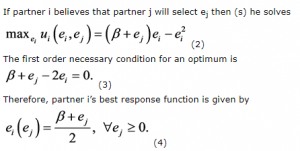Matching Markets and Power in Marriage
Gary Becker was the first person to theorize a “marriage market,” where people are matched with each other for mutual benefit, making choices along the way. Mutual benefit can be assumed because marriage is usually a choice made freely by both parties, and the only reason someone would make that decision is for their own benefit, whether in an economic or emotional way. Marriage involves making choices; as Becker explained, “Not everybody can marry the same wonderful man or woman, and they have to make choices. And they may have met somebody who they’re pretty happy with. They wonder about whether if they’d waited they’d meet somebody better, and these are the kinds of choices one makes in other markets. So using market as a metaphor, but I think it’s a very good metaphor for what goes on here.”
I described above how marriage is a choice made by free will. However, in many countries, arranged marriages are common. In non-arranged marriages, people usually spend a lot of time together beforehand to ensure compatibility. An arranged marriage will likely have a greater “time investment problem,” where couples will need to invest more time into improving their relationships. Batabyal used a game theory model to solve for the best response of each player/spouse, shown below where e is the effort put in.
Solving the equation leads to ei=ej=β, so as ei increases ej will also increase: “The effort and time investment of married partner 1 is increasing in the corresponding investment of married partner 2.”
As with other social networks, marriage comes with its own power dynamics. The textbook tells us that “imbalance in a relationship may be almost entirely the result of the personalities of the two people involved. But in other cases, it may also be a function of the larger social network in which the two people are embedded — one person may be more powerful in a relationship because they occupy a more dominant position in the social network, with greater access to social opportunities outside this single relationship.” If one person has an outside option of another relationship, they will be tempted to cheat, which can lead to divorce. As we discussed in class, having outside options changes the way power is distributed within the family, following Nash bargaining outcomes. Having this outside person to theoretically exchange with will alter the starting relationship: “The more attractive an individual’s opportunities outside the family, the more strongly that individual’s preferences will be reflected in the intrafamily distribution of resources.”
http://www.scirp.org/(S(vtj3fa45qm1ean45vvffcz55))/journal/PaperInformation.aspx?PaperID=67086

